
The former prime minister, who in his youth had a front-row seat to the foment of the Quiet Revolution, has died at age 84.
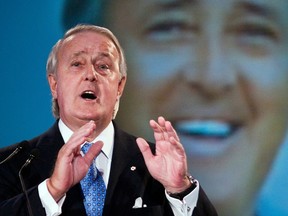
Brian Mulroney, whose tenure as prime minister was marked by momentous economic change and two tumultuous attempts to reform the Canadian Constitution, has died at age 84, his daughter Caroline Mulroney announced Thursday evening.
“He died peacefully, surrounded by family,” Caroline Mulroney announced on X, formerly Twitter, just before 6 p.m. “We will share details of arrangements when they become available.”
A family spokesperson says Mulroney died surrounded by his family in a Palm Beach hospital, where he’d been since a recent fall.
During his time in power from 1984 to 1993, Mulroney introduced the Goods and Services Tax and negotiated free trade agreements with the United States and Mexico. Contentious at the time, the GST and free trade are now mainstays of the Canadian economy.
But Mulroney, a Quebec-born anglophone embraced as family by francophone Quebecers, saw one of his biggest ambitions as PM and leader of the Progressive Conservative Party — to finally convince his home province to endorse the Canadian Constitution — end in utter failure.
Instead of unifying the country, the efforts almost led to its destruction, fueled by the defection of Lucien Bouchard, a minister in Mulroney’s government and his one-time confidant who almost split Quebec from the rest of Canada.
By the time he quit, Mulroney was deeply unpopular. In his aftermath, the Progressive Conservative Party was left in tatters.
Born of modest means, Mulroney grew up in Baie-Comeau on the north shore of the St. Lawrence River, his father an electrician at the local paper mill, his mother a homemaker.
Outspoken and self-assured from a young age, he took to politics naturally as a teenager at St. Francis Xavier University in Nova Scotia, joining the Tory club and attending the convention that elected John Diefenbaker as party leader in 1956.
His sights already set on a political career, Mulroney went to Université Laval in Quebec City for his law degree.
There, he connected with francophones and improved his French, which was faltering after years away from Quebec. Fellow student Bouchard, a bookish nationalist, became a close friend.
It was the early 1960s and young Mulroney had a front-row seat to the foment of the Quiet Revolution, a period when francophones started to take the levers of power in Quebec society.
At Laval, “he made himself into a truly bicultural Canadian, equally at home in French and English, equally at ease in French-Canadian and English-Canadian society,” John Sawatsky wrote in his biography of Mulroney, The Politics of Ambition.
“Mulroney’s cultural transformation was much more than a linguistic achievement. During his years at Laval, he watched the Quiet Revolution unfold and changed his outlook on Confederation. He now thought like a Quebecer. Although he still valued a strong central government with no special status for any province, Quebec’s priorities had become his priorities.”
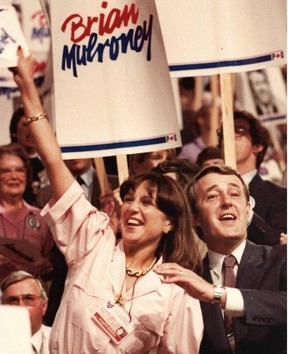
Mulroney went on to become one of Quebec’s top labour lawyers, helping bring labour peace to the Port of Montreal and an end to a long, bitter strike at La Presse.
But Mulroney’s first taste of exposure to the general public came in 1974 when Premier Robert Bourassa asked him to serve as management representative on a commission of inquiry into violence and corruption in the construction industry. Bouchard was the commission’s lawyer. It was chaired by Robert Cliche, under whom Mulroney and Bouchard had studied at Laval.
The Cliche Commission, with its sordid tales of rampant criminal activity in construction unions, made front-page news in the mid-1970s. It put the public spotlight on Mulroney. Now cast as a crime buster, he had a strong sense of media relations and ensured headline material came out in time for deadlines.
Tapping his new fame, he took a bold stab at federal politics. Instead of starting as a backbencher, he wanted to go straight to the top, running for the Progressive Conservative leadership in 1976 against Joe Clark and Claude Wagner.
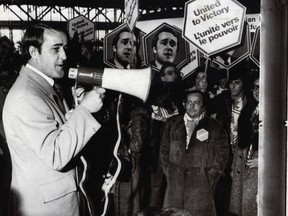
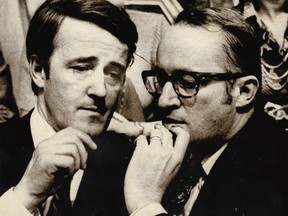
Despite Mulroney’s strong showing in the first round of voting, Clark won the day.
In the ensuing years, Mulroney would bide his time as a top executive at the Iron Ore Company of Canada.
Behind the scenes, he was plotting against Clark, a wobbly leader whose minority government fell on a non-confidence motion after less than nine months in office in 1979.
Four years later, Mulroney defeated Clark to win the leadership.
Playing up his Quebec roots and business know-how, Mulroney forged a big-tent coalition, bringing together Quebec nationalists and conservatives of all stripes — fiscal, social and progressive.
It worked like a charm.
In 1984, Mulroney won one of the biggest landslides in Canadian history. His PCs took 211 of 282 seats in the House of Commons, including more than three-quarters of the seats in Quebec.

Lucien Bouchard, who had worked on Mulroney’s 1976 leadership run and later for the Yes side in the 1980 Quebec sovereignty referendum, helped devise Mulroney’s Quebec strategy for the 1984 federal election.
He also wrote some of Mulroney’s key speeches, including a seminal one in which the future PM promised to bring Quebec back into the constitutional fold “with honour and enthusiasm.”
Quebec was left out in the cold in 1982 when the Constitution was repatriated; it was the only province not to endorse a constitutional plan negotiated by Prime Minister Pierre Trudeau and premiers of the nine other provinces. Premier René Lévesque called it a betrayal, accusing other provinces and Trudeau of stabbing Quebec in the back.
Giving federalism a try, Bouchard would become Mulroney’s Quebec lieutenant and environment minister.
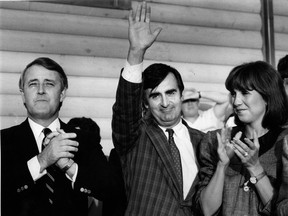
The ascension of Mulroney, who knew key Parti Québécois figures well from his days at Laval and his time as a lawyer, changed the dynamic in Quebec, according to political journalist Graham Fraser.
“For the first time in their history, the Conservatives had chosen a Quebecer,” Fraser wrote in P.Q.: René Lévesque and the Parti Québécois in Power.
“More than that, they had chosen an old-fashioned politician and a skilful conciliator. But, most important for the future shape of Canadian politics, they had chosen the first English-speaking Quebec politician acknowledged as a Quebecer by French-speaking Quebecers.”
Capitalizing on that goodwill, Mulroney took it upon himself to heal the wounds created in Quebec by the 1982 repatriation.
After months of discreet talks with the provinces, he convened premiers in 1987. Ever the skilled negotiator, he managed to reach a deal to the surprise of many observers.
Under the Meech Lake Accord, Quebec would be recognized as a “distinct society.” Every province would have a say in appointments to the Senate and the Supreme Court of Canada. Quebec would effectively have a veto over major constitutional changes. All provinces would play a greater role in immigration.
Quebec, under Bourassa, ratified the deal in June 1987, with other governments required to endorse it within three years.
But political circumstances and provincial governments changed. Newly elected premiers began to have reservations about the deal their predecessors had signed, concerned it would weaken Ottawa and give Quebec special status.
The accord died in June 1990 after Manitoba and Newfoundland failed to ratify it.
By then, the Mulroney-Bouchard friendship was also dead.
Bouchard had already quit the Progressive Conservative government. In trying to rescue the deal, Mulroney was “making an alliance with those who want Quebec to continue to be humiliated,” Bouchard said.
Bouchard then founded the separatist Bloc Québécois, which remains a powerful force in Quebec decades later.
Mulroney felt so betrayed by his old friend Bouchard that he privately declared that if he died and Bouchard turned up at his funeral, the service was to be stopped until Bouchard left the church, the Montreal Gazette reported in 2000. After Mulroney’s death, Bouchard said the two had reconciled and in recent months had become close friends again.
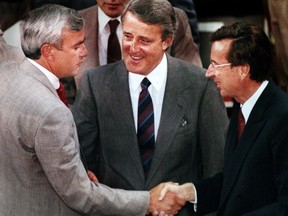
Two years after Meech collapsed, Mulroney’s second bid for a constitutional deal — the Charlottetown Accord — also ended badly.
An October 1992 referendum failed to win popular approval for the so-called Charlottetown Accord, with a set of constitutional amendments that included recognizing Quebec as a distinct society. Nationally, it was rejected by 54 per cent of voters. In Quebec, which held its own referendum, 57 per cent of voters said No.
Despite his constitutional failures, Mulroney remained well-respected in Quebec among politicians of all stripes.
In 2002, he became the first Canadian prime minister invested to the National Order of Quebec. At the ceremony, Parti Québécois Premier Bernard Landry praised Mulroney’s constitutional efforts.
“I often hear harsh criticism of Mulroney. That’s ingratitude,” Landry said. “Charlottetown and Meech were noble attempts. … But at that moment, it was the ultimate attempt that showed that Canada was not reformable.”
Mulroney has been praised for signing a pact with the United States on acid rain and for helping bring about the Montreal Protocol, a global agreement to phase out ozone-depleting substances. He also resisted calls to lift sanctions against South Africa over apartheid.
But his time in office was also marred by multiple scandals — 10 cabinet ministers left amid controversy — as well as criticism over patronage favours for Tory faithful.
Two years out of office, Mulroney was thrust back into the spotlight in what became known as the “Airbus affair.”
He was accused in a government document sent to Swiss authorities of taking illicit payments for steering an Air Canada contract to the French airplane manufacturer, a charge the government couldn’t back up when Mulroney sued and won a $2-million settlement in 1997.
A decade later, Mulroney testified at a public inquiry into the affair, admitting he had accepted $225,000 in cash from lobbyist Karl-Heinz Schreiber and calling it “a serious error in judgment.” He denied any wrongdoing, including tax evasion or accepting kickbacks. Schreiber contended he had given Mulroney $300,000.
In his final report, inquiry commissioner Justice Jeffrey Oliphant found it had been “inappropriate” for Mulroney to have accepted “cash-stuffed envelopes” from Schreiber, to keep no records, and to disclose the payments to nobody, not even the taxman, until years later. He also slammed Mulroney for not being forthright in testimony he had given during a pre-trial hearing of his libel case about his business relationship with Schreiber.
Mulroney left politics in 1993 after two mandates, the first Tory PM to clinch back-to-back majorities since John A. Macdonald.
But, by the end, the bloom was off the rose. Disgruntled Canadians had had enough. They were angry over the GST and free trade. And they had had it up to here with constitutional kerfuffles.
There was some solace for Mulroney. His successor, Liberal Jean Chrétien, may have railed against free trade and the GST while campaigning but he kept both in place after he took office. The GST is credited with helping Chrétien’s government tame the federal deficit.
The first post-Mulroney election was devastating for the Progressive Conservatives. The party won only two seats.
Mulroney’s coalition had fallen apart. Disgruntled Westerners saw him as just another Quebecer favouring his home province, and they hightailed it to the more conservative Reform Party. Many disillusioned nationalist Quebecers found a home with Bouchard’s Bloc.
Despite Mulroney’s tireless effort to get a deal done, Meech and Charlottetown cemented the view in Quebec that the rest of Canada was inflexible, setting the stage for Quebec’s second referendum in 1995.
It was Mulroney’s former college pal who stole the show for the Yes side.
Thanks to Bouchard’s fiery speeches and relentless campaigning, sovereignists shot up in the polls as voting day drew near. In the end, Canada barely survived. The No side’s margin of victory: 54,288 out of 4.7 million votes.
In 2006, the House of Commons recognized that “the Québécois form a nation within a united Canada” in a surprise motion proposed by Conservative Prime Minister Stephen Harper.
But Quebec has still not signed the Constitution. And, stung by Meech and Charlottetown, politicians across the country — once eager to discuss changes to Canada’s Constitution — remain allergic to formal constitutional talks.
After quitting politics, Mulroney worked as a lawyer and sat on corporate boards, including that of Quebecor, the publishing and cable empire controlled by former Parti Québécois leader Pierre Karl Péladeau.
Mulroney’s party eventually dropped “progressive” from its name. In 2003, it merged with the Canadian Alliance, formerly the Reform Party.
Mulroney backed the creation of the new Conservative Party of Canada, saying a new national conservative coalition was needed to defeat the Liberals.
In September 2023, Mulroney praised the party’s leader, Pierre Poilievre, saying a speech he gave at a party convention was “probably the best convention speech I have ever witnessed.”
But the former PM wasn’t shy about also lauding Liberal Prime Minister Justin Trudeau. In a speech in June 2023, Mulroney effusively defended Trudeau.
He said Trudeau would be remembered for his leadership on the COVID-19 pandemic and free trade and its support for Ukraine in its war with Russia.
“I have learned over the years that history is unconcerned with the trivia and the trash of rumours and gossip floating around Parliament Hill,” Mulroney said. “History is only concerned with the big ticket items that have shaped the future of Canada.”
Mulroney is survived by his wife, Mila, and his children, Ben, Caroline, Mark and Nicolas.
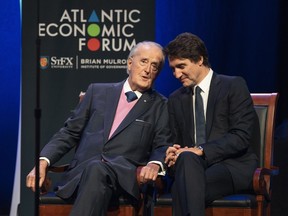
With files from Hubert Bauch, Irwin Block and Elizabeth Thompson and The Canadian Press.